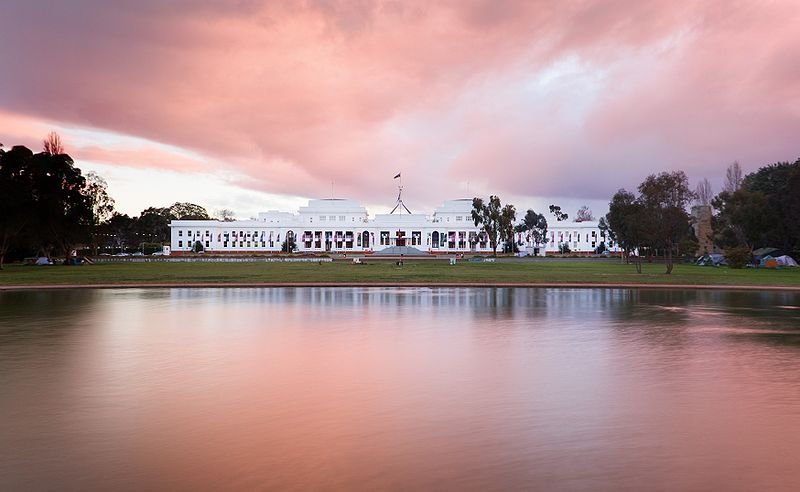 The Old Parliament House in Canberra, Australia
The Old Parliament House in Canberra, AustraliaSource: https://en.wikipedia.org/wiki/File:Old_Parliament_House_Canberra_NS.jpg
Author: Noodle snacks

Canberra is a city specially planned to be the capital of Australia. It has a population of 345,000, making it the largest inland city in the country, and the eighth largest overall. Canberra is 280 km (170 miles) from Sydney and 660 km (410 miles) from Melbourne. It is located within the Australian Capital Territory, which is on the southeastern part of New South Wales, near the border with the state of Victoria.
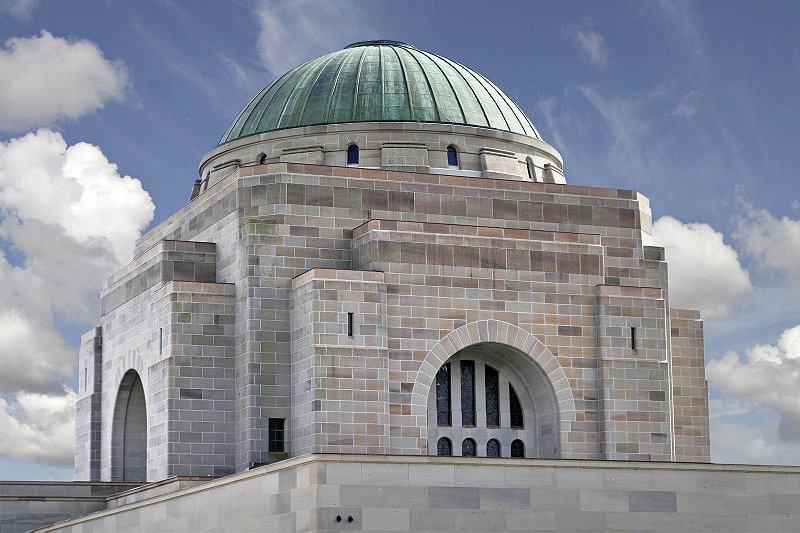 The Australian War Memorial in Canberra
The Australian War Memorial in CanberraSource: https://commons.wikimedia.org/wiki/File:Australian_war_memorial.jpg
Author: Fir0002/Flagstaffotos

The site of Canberra was selected in 1908. Following an international contest, the design by Chicago architects Walter Burley Griffin and Marion Mahony Griffin was selected, and construction began in 1913. The name of the city comes from the Ngyunnawal tribe which lives in the Canberra region. It means "meeting place". The name was given by Lady Denman, the wife of Governor-General Lord Denman, on 12 March, 1913, during a ceremony on Kurrajong Hill, the site of the present-day Parliament House of Australia. Since then, the founding of Canberra is celebrated annually on the second Monday of March.
Canberra experiences a continental climate with hot summers and cold winters. December to February are the hottest months, with temperature reaching an average high of 26.1°C (79°F) or more. Coldest month is July, when the average low is -0.1°C (32°F). Heaviest rains are in spring, in the months of October and November, with monthly precipitation of 61.2 mm (2.41 inches) or more. The driest months are June and July with less than 41.2 mm (1.62 inches) of precipitation.
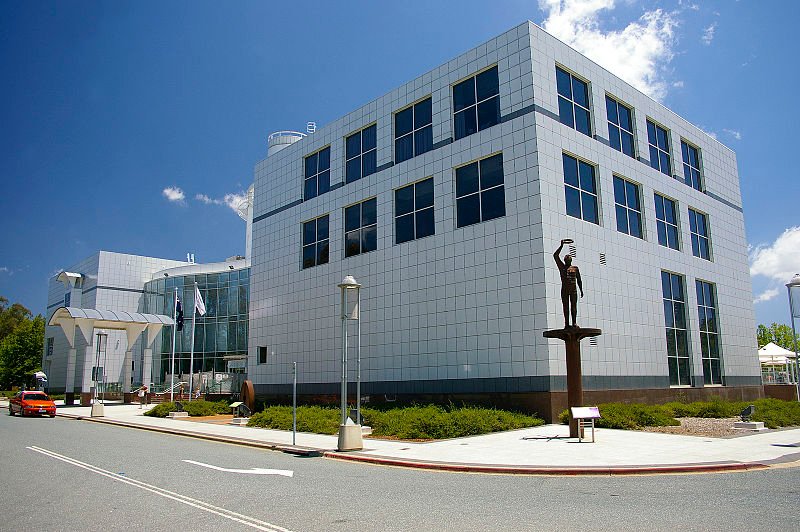 Questacon, the National Science and Technology Centre in Canberra
Questacon, the National Science and Technology Centre in CanberraSource: https://commons.wikimedia.org/wiki/File:Questacon.jpg
Author: Bidgee

Going to Canberra
By PlaneCanberra is served by the Canberra International Airport (CBR). There are flights from most major cities in Australia. The main airlines are Virgin Blue, Qantas, Tiger Airways and Brindabella Airlines. The majority of international travelers arrive in Canberra through a transfer in Sydney or Melbourne.
There's a shuttle bus between Canberra Airport and the bus interchange in Civic, the Central Business District of Canberra. It costs A$9.00. Taxi ride to Civic costs A$25.00.
By Train
A train to Canberra from Sydney takes around 4 hours, and rewards you with panoramic scenery of the Southern Highlands and Molongolo Gorge. The fare ranges between A$40 to A$56.
Traveling within Canberra
The public transportation authority in Canberra is known as ACTION. A single ride costs A$3.00 for adults. You can also buy an all-day off-peak ticket for A$4.10, which you can use between 9:00 am to 4:30 pm and after 6:00 pm, and all day on week ends and public holidays.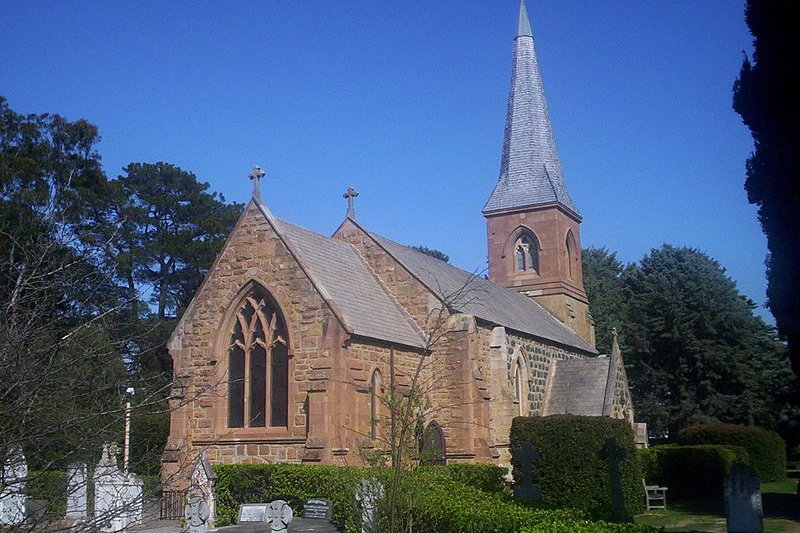 The Church of St John the Baptist in Reid is the oldest church in Canberra
The Church of St John the Baptist in Reid is the oldest church in CanberraSource: https://en.wikipedia.org/wiki/File:St_johns_church_in_reid_canberra.jpg
Author: Cfitzart

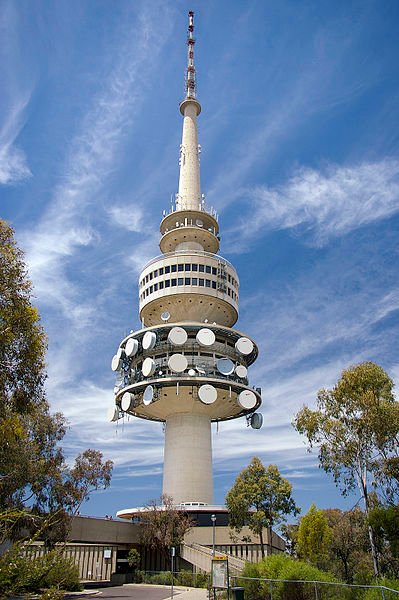 Black Mountain Tower, a major landmark in Canberra, named after its location on Black Mountain
Black Mountain Tower, a major landmark in Canberra, named after its location on Black MountainSource: https://commons.wikimedia.org/wiki/File:Telstra_Tower_2009.jpg
Author: Bidgee

 Places of Interest in Canberra
Places of Interest in Canberra
- Parliamentary Triangle
Site in Canberra where most of its major monuments and national buildings are located. - Old Parliament House
First parliamentary building in the new capital of Canberra, completed in 1927. - Blundell's Cottage
19th century farm cottage that has existed before Canberra became the capital. - National Capital Exhibition
Rotunda to the north of Lake Burley Griffin, recommended as the starting point for exploring Canberra. - National Library of Australia
Repository of Australia's literary and documentary heritage, housed in an iconic 1960's building. - Questacon - The National Science and Technology Centre
High-tech science centre with lots of interactive exhibits. - High Court of Australia
Imposing lakeside building opened by Queen Elizabeth II in 1980. - St John the Baptist Church
Anglican church built in 1844, order than Canberra. - Schoolhouse Museum
Museum formerly a schoolhouse, located next to St John the Baptist Church, also from the 19th century, one of the oldest buildings in the area. Museum houses 19th century memorabilia. - Red Hill
Hill with excellent views of Canberra. - Royal Australian Mint
The national mint, sole producer of Australian coins. - Government House
Official residence of the Governor General, representative of the monarch in Australia, since 1927. Closed to the public except on special open days. - Yarralumla
Suburb on the edge of Capital Hill, housing over 80 of Australia's foreign embassies. - National Gallery of Australia
Gallery holding some 100,000 works of Australian art, from the days of the European settlement to present day. - Australian War Memorial
Memorial to all Australians who perished while serving their country. - Civic Square
Public square at the Civic Centre, the commercial heart of Canberra. - Australian National Botanic Gardens
Gardens with the finest scientific collection of native plants in the country. - Black Mountain Tower
195-meter (640 feet) tower above the summit of Black Mountain with viewing platforms offering superb all-around views. - National Zoo and Aquarium
Australia's only combined zoo and aquarium, with 20 tanks and 9 hectares of landscaped grounds. - Australian Institute of Sport
The national centre of sports in Australia, where the athletes train. The national athletes are often available to show visitors around. - National Museum of Australia
Museum in an innovative, purpose-built facility that has become an architectural landmark.
Sights Further Afield from Canberra
- Mugga-Mugga
One of the earliest historic sites of Canberra, exhibiting the working class living quarters of the 19th century. - Murrumbidgee River
River in the Australian countryside good for picnics, swimming and camping. - Canberra Deep Space Complex
Facility managed by the Commonwealth Scientific and Industrial Research Organization (CSIRO) and NASA, one of three deep-space tracking centers in the world. - Tidbinbilla Nature Reserve
5,450-hectare (13,450 acre) reserve comprising forestland, grassland, streams and mountains, with wildlife such as kangaroos, emus and platypuses. - Namadgi National Park
Covering almost half of the Australian Capital Territory, and only 35 km (22 miles) from Canberra, the national park offers a rugged yet beautiful landscape.
Back to Discover Australia
 Latest updates on Penang Travel Tips
Latest updates on Penang Travel Tips

Copyright © 2003-2025 Timothy Tye. All Rights Reserved.

 Go Back
Go Back